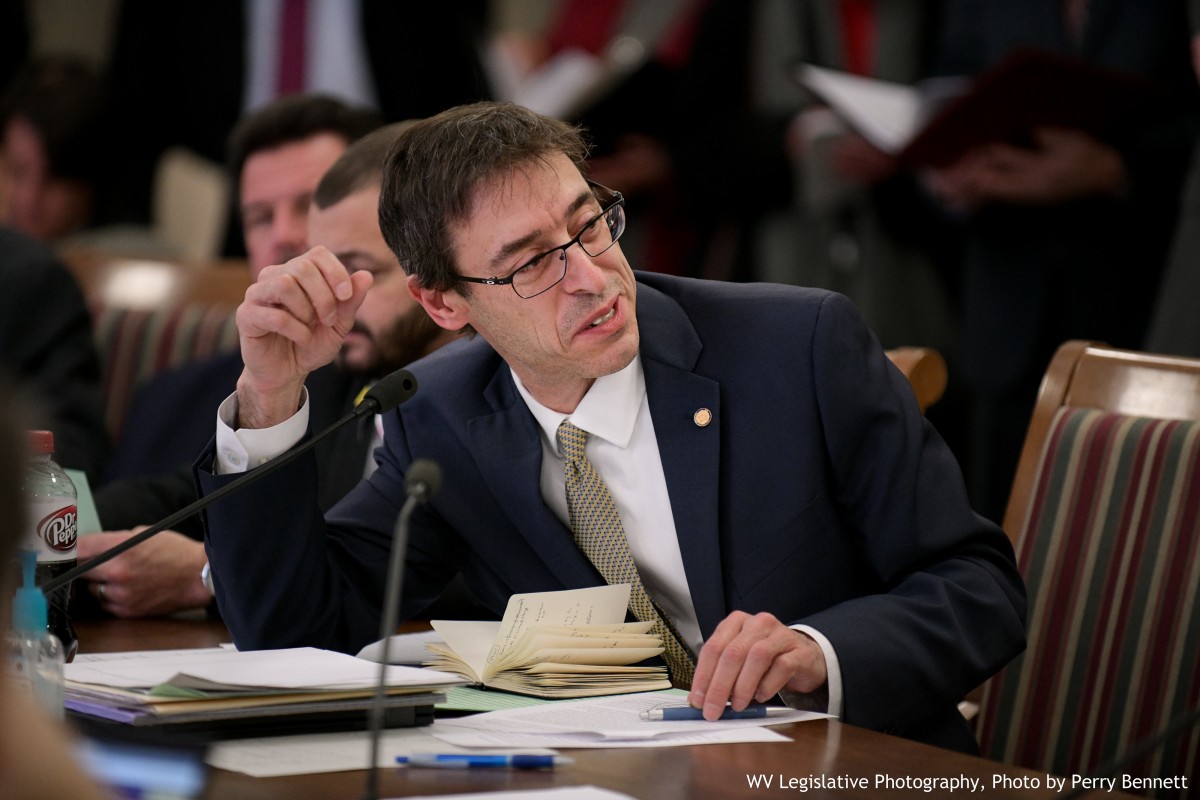MORGANTOWN — Delegate Evan Hansen has revived his Modern Jobs (MoJo) Act for a second try during the 2020 legislative session.
It’s aimed at promoting industry and creating jobs by allowing major consumers of electricity to produce or purchase solar power or power produced by cogeneration where the power supply is sited on a former mine site.
Last session the bill sat ignored in the House Technology and Infrastructure Committee. This year, it’s already taken a step farther, getting a two-hour review by the Joint Standing Committee on Energy during the November interims.
The committee didn’t vote to recommend the bill, said Hansen, D-Monongalia, but it gave it lengthy consideration. “This is what I think we needed to happen as a next step is to talk about it in an interim committee meeting and give an opportunity for people to ask questions and learn more about the issue.”
“Before the session starts in January,” he said, “we’ll be building bipartisan support for it.” Last year, he had to turn away interested sponsors, he said. It had the full complement of 11 allowed under House rules, including four Republicans.
As with last year’s version, HB 2589, he goal is to serve big power users — either existing industry or corporations that have significant renewable energy targets.
It would allow the power user – a commercial, industrial or manufacturing entity or a higher education institution or nonprofit – to establish a solar facility with a capacity up to 200 megawatts or a cogeneration plant (which produce both power and steam for heat) on the former mine site, or enter into a power purchase agreement with a third-party non-utility that would build on the site.
While Hansen had cogeneration in mind last year, HB 2589 didn’t specifically mention it; this version does.
The solar or cogen facility would not be considered a utility. But the power would be transmitted to the user via available utility lines through a “wheeling agreement” with the utility (the electricity is “wheeled” to the user via the utility lines).
WVU law professor Jamie Van Nostrand, director of the law school’s Center for energy and Sustainable Development, testified to the committee regarding the bill and shared his four main points with The Dominion Post.
One, the MoJo Act would keep jobs here. West Virginia’s electricity rates have increased 6.1% annually over the last 10 years, he said, compared to a 1.4% nationally. The state’s rates have risen faster than any other state in the country over the past decade.
This makes it hard, he said, for manufacturers to stay competitive when they are competing with companies in other states with lower energy costs. So access to cost-competitive solar power would help large employers manage their energy costs.
Two, the act positions West Virginia to be able to attract new jobs. About half of the Fortune 500 companies have climate or energy goals, he said, including securing a certain percentage of their energy supply from renewables.
For example, he said, Procter & Gamble wants 100% renewable energy at its plants by 2030; Toyota wants to eliminate all carbon emissions from the manufacturing of parts and materials by 2050.
Meanwhile, he said, West Virginia’s power is 92% coal-fired, he said. “The MoJo Act would give these large employers access to renewable energy and help them achieve their corporate sustainability goals.”
Three, the act positions West Virginia to participate in the expansion of the solar industry. Nearly 3.3 million Americans working in clean energy – outnumbering fossil fuel workers by 3-to-1, he said. Clean energy employment grew 3.6% in 2018, adding 110,000 net new jobs and employers expect 6% job growth in 2019.
And four, it allows former mine lands to put to productive use, Van Nostrand said. West Virginia has more than 550 square miles of formerly surface-mined land, less than 2% of which has been put into productive use.
And the state has 219 miles of formerly mined land and other degraded land that is viable for large-scale solar energy production, based on site size, proximity to electricity infrastructure, and solar irradiance levels.
One of the realities of moving legislation is that minority-sponsored bills face a bigger hurdle of seeing a committee agenda, no matter which party is in the majority. Sometimes identical bills will be introduced with different sets of sponsors, or a bipartisan bill’s lead sponsor will change to a member of the majority.
Hansen’s bill already has bipartisan support and he said, when asked, that if necessary he’d consider allowing a Republican to be lead sponsor.
“I want to get good policy passed,” he said. “I’m just thankful the leadership is providing the opportunity to give this bill fair consideration, and if they’re behind it and they want to sponsor it, all the better.”
The bottom line, Hansen said, is that the bill doesn’t reflect a value judgement about where energy should come from, but it reflects the reality of the market today, that renewables are being demanded by the private sector. “And if we’re not able to provide that in West Virginia, we’re losing jobs.”
Tweet David Beard @dbeardtdp Email dbeard@dominionpost.com





